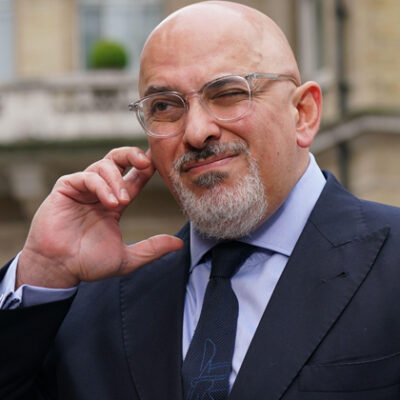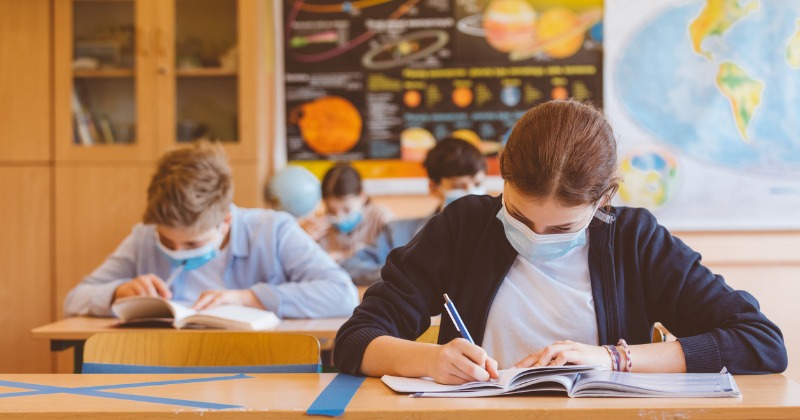The government is to reintroduce its recommendation that masks be worn in secondary school classrooms for at least three weeks this month in response to the surge of the Omicron Covid variant.
Ministers have also announced plans to provide 7,000 air cleaning units to schools and colleges, but the roll-out will not start until next month.
Meanwhile serving school leaders who work as Ofsted inspectors will also not be called-upon to carry out inspections.
Schools affected by Covid-related staff absence will be encouraged to request deferrals of inspections, the government said.
Education secretary Nadhim Zahawi said the measures will “bolster our support [for] schools as we do everything in our power to minimise disruption”.

The Department for Education announced in a press release today that it was “temporarily” recommending that face coverings be worn in classrooms and teaching spaces for students in year 7 or above.
The recommendation was lifted last May. But masks have been recommended in corridors and other communal areas for staff in all schools and for secondary pupils since late November.
The advice to wear masks in secondary classrooms will remain in place until January 26, when it will be reviewed.
A record high of 162,572 new Covid cases in England were reported in the latest 24-hour period.
School-age children were most likely to be infected.
The Office for National Statistics estimated that in the week to December 11, more than one in 20 primary age pupils and one in 35 secondary age pupils tested positive for Covid.
More air cleaning units, but quantity ‘inadequate’
Ministers have also announced that 7,000 more air cleaning units will be sent to schools, colleges and early years settings to improve ventilation in classrooms. The DfE had already pledged to provide 1,000 of the devices to alternative provision and special schools in November.
The DfE said units will be for areas where “quick fixes to improve ventilation are not possible, such as being able to open a window”.
But the units, paid-for by the government, will not start to be delivered until next month.
Dr Mary Bousted, joint general secretary of the National Education Union, said: “Seven thousand more air purifiers is something, but it is completely inadequate for what should be a basic human right, the provision of clean air in every classroom in every educational setting.
“The fact that the government have provided the extra purifiers shows that it recognises the problem but with over 300,000 classrooms in England they have failed to provide an effective solution.”
It comes after the DfE launched a marketplace for schools to buy air purifiers last month. At the time, Schools Week analysis estimated that it would cost schools at least £5,900 to fund one unit in every classroom.
Serving leaders won’t be called up for inspection duty
The government has also announced that Ofsted will not ask inspectors who are serving school leaders to undertake inspections, to allow them to “focus on their leadership responsibilities at this critical time”.
The temporary measure will be in place from the start of January. The DfE has not said how long it remain in place.
Ofsted had already announced that it would not inspect secondary schools in the first week of term so that returning pupils can be tested on-site.
The inspectorate will also encourage schools that are “significantly impacted” by Covid-related staff absence to ask for their inspections to be delayed.
Zahawi said being in the classroom was “undoubtedly the very best place for children”, and said he was “looking forward to welcoming pupils back next week”.
He said the Omicron variant presented “challenges”, but added that the education sector had “responded with a Herculean effort, and for that I thank each and every one of you”.
“The prime minister and I have been clear that education is our number one priority.”
Unions warn year groups may be sent home
Leadership unions welcomed the measures, but said action should have been taken earlier.
Geoff Barton, general secretary of ASCL, said the measures represented a “recognition by the government that the spring term will be extremely challenging for schools and colleges”.
“The biggest problem they face is the likelihood of high levels of staff absence caused by the prevalence of the Omicron variant,” he added.
“While schools and colleges will do their very best to minimise the impact on pupils, as they always do, there is a possibility that this will mean that some classes and year groups have to be sent home for short periods of time to learn remotely.”
Paul Whiteman, leader of the NAHT, said reintroducing face coverings “appears to be a sensible move, given the circumstances”.
He welcomed the air cleaning units, but said the government should monitor demand and “make more available as required, to ensure all schools that need one, get one”.
Whiteman added that encouraging schools to ask Ofsted for deferrals was “helpful”, but it would be “even better if all uncertainty were removed by simply suspending inspections entirely this term so inspectors can return to the classroom, to help the effort”.















English
maths
Computer skills
Learning skills
cooking skills
food hygiene
money organisation focus on skills
Art
Gym
work shop
make posters Learning skills
writing skills
maths money skill test
budget maths
training day